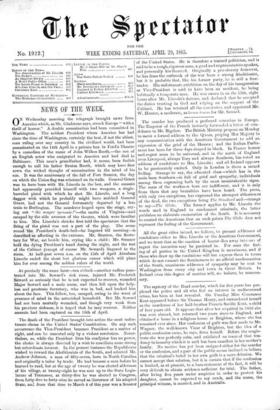NEWS 01? THE WEEK.
ON Wednesday morning the telegraph brought news from America which, as Mr. Gladstone says, struck Europe "with a thrill of horror." A double assassination had been committed in Washington. The noblest President whom America has had since the time of Washington, certainly the best, if not the ablest, man ruling over any country in the civilized world, had been assassinated on the 14th April in a private box in Ford's Theatre by a comedian of the name of John Wilkes Booth,—the son of an English actor who emigrated to America and had died in Baltimore. This man's grandfather had, it seems, been foolish enough to call his father Brutus Booth, which may have first sown the wicked thought of assassination in the mind of his son. It was the anniversary of the fall of Fort Sumter, the day on which the Union flag was rehoisted on its walls. General Grant was to have been with Mr. Lincoln in the box, and the assassin bad apparently provided himself with two weapons, a single- barreled pistol with which he shot Mr. Lincoln, and a long dagger with which he probably might have stabbed General Grant, had not the General fortunately departed by a late train to Burlington. The murderer leaped upon the stage, cry- ing out "Sic semper tyrannis !"—the motto of Virginia—and escaped by the side avenues of the theatre, which were familiar to him. Mrs. Lincoln's shrieks first told the spectators that the firing of the pistol was not a part of the play. The scene round the President's death-bed—he lingered till morning—is described as affecting in the extreme. Mr. Stanton, the Secre- tary for War, sat beside him, crying like a child ; Mr. Sumner held the dying President's hand during the night, and the rest of the Cabinet (except of course Mr. Seward) lingered in the room. At half-past seven a.m. on the 15th of April Abraham Lincoln ended the short but glorious career which will place him for ever among the noblest rulers of the world.






























